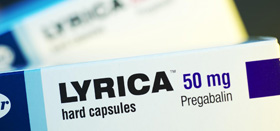NHS could claim half a billion pounds back, if Pfizer pregabalin appeal fails

The way could be open for the NHS to reclaim £502m in prescribing costs if Pfizer’s last-ditch legal bid to uphold their patent for Lyrica is unsuccessful, concludes a new study.
Researchers found that Lyrica prescriptions shot up by 25% across England, after GPs were told by NHS England in 2015 that they must prescribe the branded version of pregabalin for neuropathic pain.
The study, published by bioRXiv and led by University of Oxford in collaboration with an intellectual property law firm, aimed to highlight the variation in the prescribing rates of branded pregabalin.
Lead researcher and campaigner Dr Ben Goldacre said that if Pfizer’s last attempt to appeal to the Supreme Court fails, the NHS should seek a reimbursement of £502m in excess prescribing costs for England alone.
The findings follow a lengthy legal battle over Pfizer’s second medical patent, granted solely for pain, for pregabalin.
The pharma giant is continuing to fight on after an unsuccessful appeal last year led to GPs being told to prescribe the generic version for all conditions. The company’s case was heard by the Supreme Court hearing from 12 to 15 February, but the outcome of which is yet to be released.
The new study looked at different geographical locations, before and after the initial instruction was sent, and calculated the excess cost implication. They found that the national proportion of pregabalin prescribed under the brand Lyrica soared from 0.3% to 25.7% across England, in the six months prior and following
They also discovered that six months before the instruction from NHS England, only 11.5% of practices prescribed Lyrica at least once. However in the six months following, this number had rocketed to 82.3%.
Nonetheless, despite NHS England suggesting that 70% of pregabalin prescriptions should be for Lyrica, only 11.6% of all practices met this target. The team found that over three quarters prescribed less than half their pregabalin as Lyrica; and over two thirds prescribed less than 30%.
They said: ‘NHS England guidance to prescribe branded Lyrica was widely ignored by NHS GPs in England: while most practices changed their prescribing behaviour to use Lyrica occasionally, most used it infrequently’.
Despite this, researchers calculated the amount that the NHS had paid for pregabalin between October 2015 and July 2017, and compared it with the amount they would have paid if pregabalin had been generically available. This resulted in a difference of £502m.
Lead author on the paper Dr Ben Goldacre said: ‘If Pfizer lose in their final appeal, and their patent for Lyrica in pain is indeed found to be invalid, then this will mean that the NHS has potentially overpaid by £502m for the drug in England alone.
‘We think it’s useful to use the prescribing data to model this excess spend, because if Pfizer do lose their appeal, then this is money that the NHS is entitled to seek reimbursement on.
‘It’s always important to give context for large numbers, but however you look at it, £502m is very large [given that] we only spend around £8bn a year on all drugs, in total, in NHS Primary Care across the whole of England.’
Regardless of the outcome however, the Pfizer patent for neuropathic pain expired in July 2017 and so does now not apply.
But a spokesperson from Pfizer told Pulse: ‘We strongly believe in the validity and importance of the second medical use patent for the use of Lyrica® in pain. The Supreme Court of the United Kingdom granted us permission to appeal a ruling issued by the Court of Appeal in October 2016, which upheld a decision by the High Court and found that the claims of the patent covering Lyrica® (pregabalin) directed generally to pain and neuropathic pain were invalid.’
Last month, a Home Office consultation proposed reclassifying pregabalin and gabapentin under the Misuse of Drugs Act and enforcing stricter controls, following official figures which showed that pregabalin-related deaths had risen from four to 111 between 2012 and 2016.
Pulse July survey
Take our July 2025 survey to potentially win £1.000 worth of tokens

Visit Pulse Reference for details on 140 symptoms, including easily searchable symptoms and categories, offering you a free platform to check symptoms and receive potential diagnoses during consultations.












